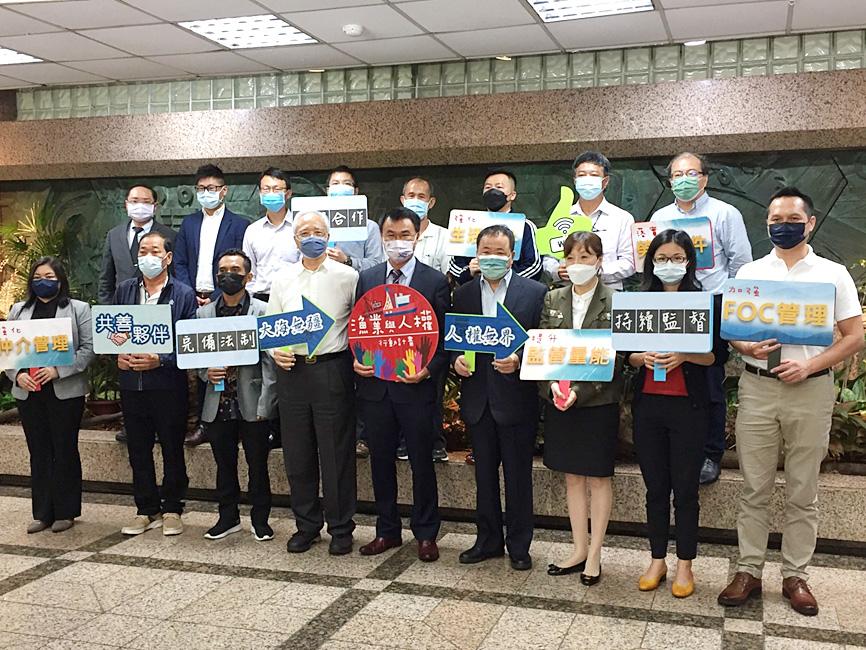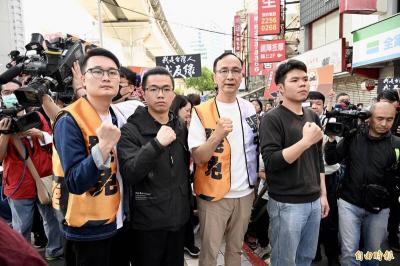The minimum monthly wage for migrant fishers working on Taiwanese-owned distant-water fishing vessels is to be increased by US$100 with effect from July, the Council of Agriculture (COA) said yesterday.
The Cabinet approved the minimum wage hike on Thursday as part of a broader plan to improve working conditions for migrant fishers, the council said.
The plan is to raise the monthly minimum pay for that category of migrant fisher from US$450 to US$550, the COA said, adding that there are about 21,000 migrant workers onboard Taiwanese-owned distant-water fishing vessels.

Photo: CNA
The salaries must be paid directly to the fishers instead of through an employment agency, and the workers have the right to contact the COA if their employers fail to adhere to that regulation, Fisheries Agency Director-General Chang Chih-sheng (張致盛) said.
Under the plan, the government has made it mandatory for migrant fishers on such vessels to have medical insurance coverage of at least NT$300,000 (US$10,253), while their accident insurance coverage has been increased from NT$1 million to NT$1.5 million.
Furthermore, crews would no longer be permitted to remain at sea for more than 10 consecutive months.
The plan was devised to improve livelihoods and human rights in the industry, the COA said.
To that end, the COA said it would step up inspections of Taiwan’s approximately 1,100 distant-water fishing vessels and encourage owners to install closed-circuit TV systems onboard to allow better monitoring of work conditions.
Port inspections would be conducted not just on Taiwan-flagged fishing vessels, but also on Taiwanese-owned boats flying a foreign flag, known as flags of convenience, it said.
Taiwan Deepsea Tuna Longline Boatowners and Exporters Association president Lin Yu-chih (林毓志) yesterday said that the new rules have given fishing boat owners pause, with some reconsidering whether to continue in the industry.
High wages for crewmembers on deep-sea fishing expeditions already weigh heavily on owners, as wages comprise 30 percent of overheads, Lin said, adding that the COVID-19 pandemic and the Russia-Ukraine war have increased owners’ expenditures, especially for fuel.
Prior to the pandemic and the war, at-sea refueling usually cost about US$100 per tonne of fuel, but, for example, it now costs US$1,380 per tonne of fuel to resupply in Argentina, he said.
Every fishing boat owner — regardless of the size of the ship — is losing money the moment the ship leaves harbor, he said.
On top of expenditures, deep-sea fish, such as tuna, are not fetching ideal prices, and in the case of restaurants having closed through the entirety of last year, fish are being sold at rock-bottom prices, he said.
However, despite the difficulties, Lin said that he would support the project because the industry wants to expand abroad.
Moreover, he is touched by the hard work of the government, he said.
COA Minister Chen Chi-chung (陳吉仲) said that the council would offer subsidies amid the industry transition.
A total of NT$640 million would be used to promote and uphold human rights in the industry, while the COA would spend NT$2 billion over four years to improve crew members’ rights, Chen said.

The Ministry of Economic Affairs has fined Taobao NT$1.2 million (US$36,900) for advertisements that exceeded its approved business scope and ordered the Chinese e-commerce platform to make corrections in the first half of this year or its license would be revoked. Lawmakers have called for stricter supervision of Chinese e-commerce platforms and more stringent measures to prevent China from laundering its goods through Taiwan as US President Donald Trump’s administration cracks down on origin laundering. The legislature’s Finance Committee yesterday met to discuss policies to prevent China from dumping goods in Taiwan, inviting government agencies to report on the matter. Democratic Progressive Party

Taiwan and its Pacific ally Tuvalu on Tuesday signed two accords aimed at facilitating bilateral cooperation on labor affairs, according to Taiwan’s Ministry of Foreign Affairs (MOFA). The governments inked two agreements in Taipei, witnessed by Foreign Minister Lin Chia-lung (林佳龍) and visiting Deputy Tuvaluan Prime Minister Panapasi Nelesone, MOFA said in a news release. According to MOFA, the agreements will facilitate cooperation on labor issues and allow the two sides to mutually recognize seafarers’ certificates and related training. Taiwan would also continue to collaborate with Tuvalu across various fields to promote economic prosperity as well as the well-being of their

The Taipei District Prosecutors’ Office has continued its investigation into allegations of forged signatures in recall efforts today by searching the Chinese Nationalist Party’s (KMT) city chapter and questioning several personnel including the chapter director, according to media reports. Among those questioned and detained were KMT Taipei chapter director Huang Lu Chin-ju (黃呂錦茹), chapter secretary-general Chu Wen-ching (初文卿), chapter secretary Yao Fu-wen (姚富文) and first district committee executive director Tseng Fan-chuan (曾繁川). Prosecutors said they would not confirm reports about who had been summoned. The investigation centers on allegations that the ongoing recall campaigns targeting Democratic Progressive Party legislators Rosalia Wu (吳思瑤)

Taiwan would welcome the return of Honduras as a diplomatic ally if its next president decides to make such a move, Minister of Foreign Affairs Lin Chia-lung (林佳龍) said yesterday. “Of course, we would welcome Honduras if they want to restore diplomatic ties with Taiwan after their elections,” Lin said at a meeting of the legislature’s Foreign Affairs and National Defense Committee, when asked to comment on statements made by two of the three Honduran presidential candidates during the presidential campaign in the Central American country. Taiwan is paying close attention to the region as a whole in the wake of a